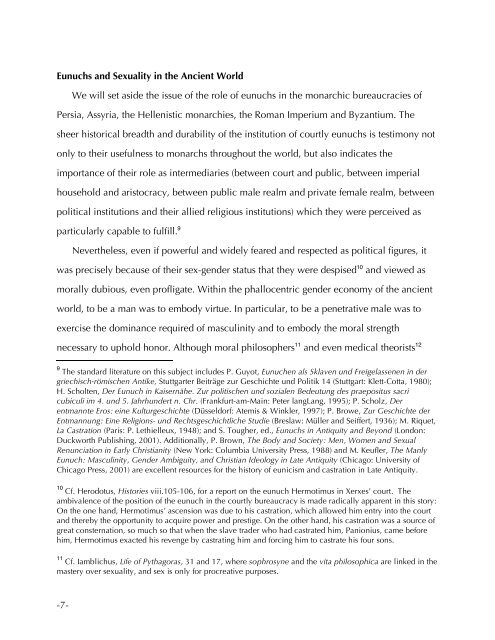-1- Eunuchs and the Postgender Jesus: Matthew 19:12 and ...
-1- Eunuchs and the Postgender Jesus: Matthew 19:12 and ...
-1- Eunuchs and the Postgender Jesus: Matthew 19:12 and ...
You also want an ePaper? Increase the reach of your titles
YUMPU automatically turns print PDFs into web optimized ePapers that Google loves.
<strong>Eunuchs</strong> <strong>and</strong> Sexuality in <strong>the</strong> Ancient World<br />
-7-<br />
We will set aside <strong>the</strong> issue of <strong>the</strong> role of eunuchs in <strong>the</strong> monarchic bureaucracies of<br />
Persia, Assyria, <strong>the</strong> Hellenistic monarchies, <strong>the</strong> Roman Imperium <strong>and</strong> Byzantium. The<br />
sheer historical breadth <strong>and</strong> durability of <strong>the</strong> institution of courtly eunuchs is testimony not<br />
only to <strong>the</strong>ir usefulness to monarchs throughout <strong>the</strong> world, but also indicates <strong>the</strong><br />
importance of <strong>the</strong>ir role as intermediaries (between court <strong>and</strong> public, between imperial<br />
household <strong>and</strong> aristocracy, between public male realm <strong>and</strong> private female realm, between<br />
political institutions <strong>and</strong> <strong>the</strong>ir allied religious institutions) which <strong>the</strong>y were perceived as<br />
particularly capable to fulfill. 9<br />
Never<strong>the</strong>less, even if powerful <strong>and</strong> widely feared <strong>and</strong> respected as political figures, it<br />
was precisely because of <strong>the</strong>ir sex-gender status that <strong>the</strong>y were despised 10 <strong>and</strong> viewed as<br />
morally dubious, even profligate. Within <strong>the</strong> phallocentric gender economy of <strong>the</strong> ancient<br />
world, to be a man was to embody virtue. In particular, to be a penetrative male was to<br />
exercise <strong>the</strong> dominance required of masculinity <strong>and</strong> to embody <strong>the</strong> moral strength<br />
necessary to uphold honor. Although moral philosophers 11 <strong>and</strong> even medical <strong>the</strong>orists <strong>12</strong><br />
9 The st<strong>and</strong>ard literature on this subject includes P. Guyot, Eunuchen als Sklaven und Freigelassenen in der<br />
griechisch-römischen Antike, Stuttgarter Beiträge zur Geschichte und Politik 14 (Stuttgart: Klett-Cotta, <strong>19</strong>80);<br />
H. Scholten, Der Eunuch in Kaisernähe. Zur politischen und sozialen Bedeutung des praepositus sacri<br />
cubiculi im 4. und 5. Jahrhundert n. Chr. (Frankfurt-am-Main: Peter langLang, <strong>19</strong>95); P. Scholz, Der<br />
entmannte Eros: eine Kulturgeschichte (Düsseldorf: Atemis & Winkler, <strong>19</strong>97); P. Browe, Zur Geschichte der<br />
Entmannung: Eine Religions- und Rechtsgeschichtliche Studie (Breslaw: Müller <strong>and</strong> Seiffert, <strong>19</strong>36); M. Riquet,<br />
La Castration (Paris: P. Lethielleux, <strong>19</strong>48); <strong>and</strong> S. Tougher, ed., <strong>Eunuchs</strong> in Antiquity <strong>and</strong> Beyond (London:<br />
Duckworth Publishing, 2001). Additionally, P. Brown, The Body <strong>and</strong> Society: Men, Women <strong>and</strong> Sexual<br />
Renunciation in Early Christianity (New York: Columbia University Press, <strong>19</strong>88) <strong>and</strong> M. Keufler, The Manly<br />
Eunuch: Masculinity, Gender Ambiguity, <strong>and</strong> Christian Ideology in Late Antiquity (Chicago: University of<br />
Chicago Press, 2001) are excellent resources for <strong>the</strong> history of eunicism <strong>and</strong> castration in Late Antiquity.<br />
10 Cf. Herodotus, Histories viii.105-106, for a report on <strong>the</strong> eunuch Hermotimus in Xerxes’ court. The<br />
ambivalence of <strong>the</strong> position of <strong>the</strong> eunuch in <strong>the</strong> courtly bureaucracy is made radically apparent in this story:<br />
On <strong>the</strong> one h<strong>and</strong>, Hermotimus’ ascension was due to his castration, which allowed him entry into <strong>the</strong> court<br />
<strong>and</strong> <strong>the</strong>reby <strong>the</strong> opportunity to acquire power <strong>and</strong> prestige. On <strong>the</strong> o<strong>the</strong>r h<strong>and</strong>, his castration was a source of<br />
great consternation, so much so that when <strong>the</strong> slave trader who had castrated him, Panionius, came before<br />
him, Hermotimus exacted his revenge by castrating him <strong>and</strong> forcing him to castrate his four sons.<br />
11 Cf. Iamblichus, Life of Pythagoras, 31 <strong>and</strong> 17, where sophrosyne <strong>and</strong> <strong>the</strong> vita philosophica are linked in <strong>the</strong><br />
mastery over sexuality, <strong>and</strong> sex is only for procreative purposes.


